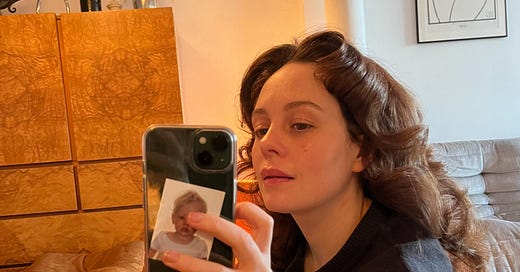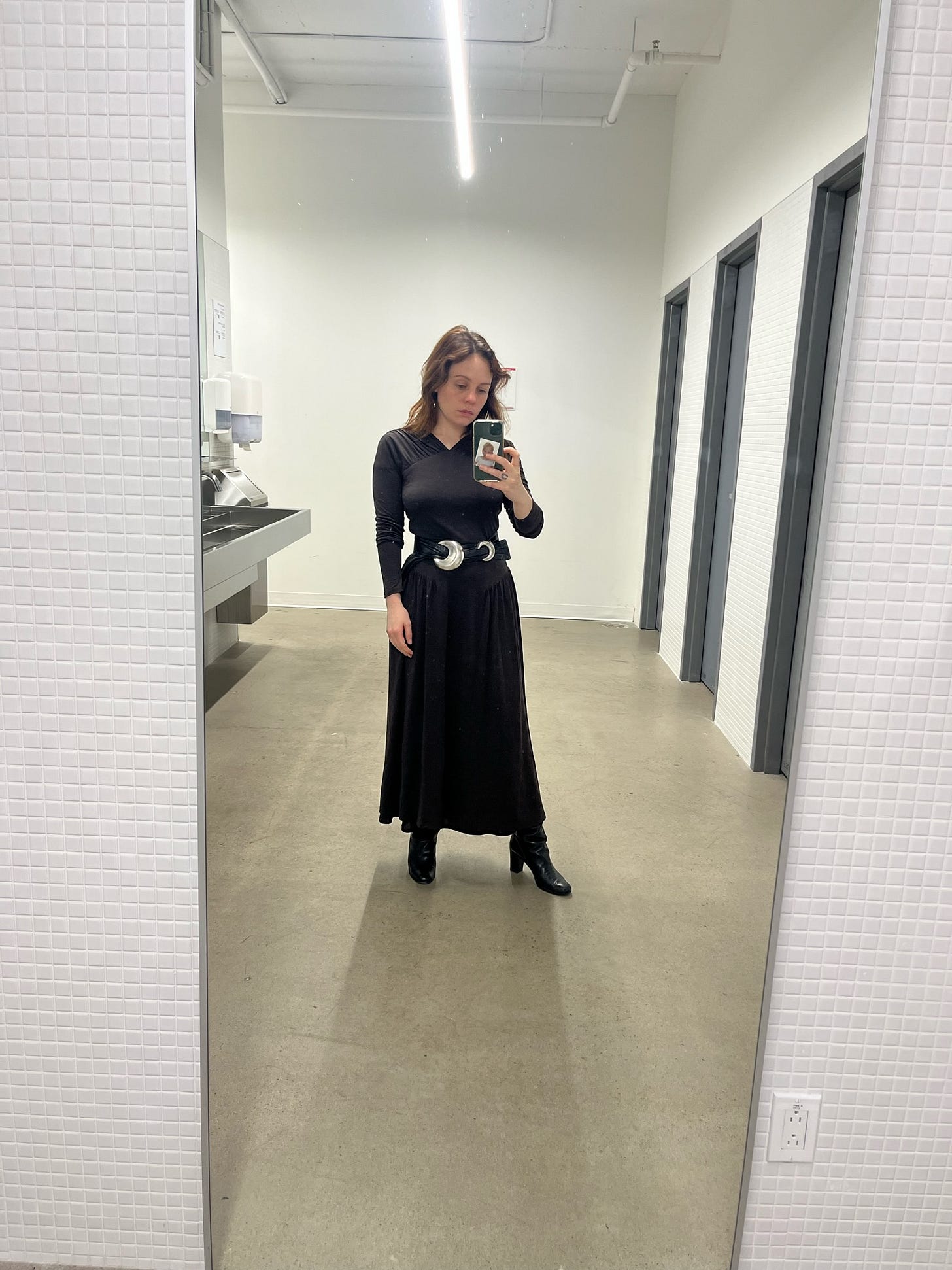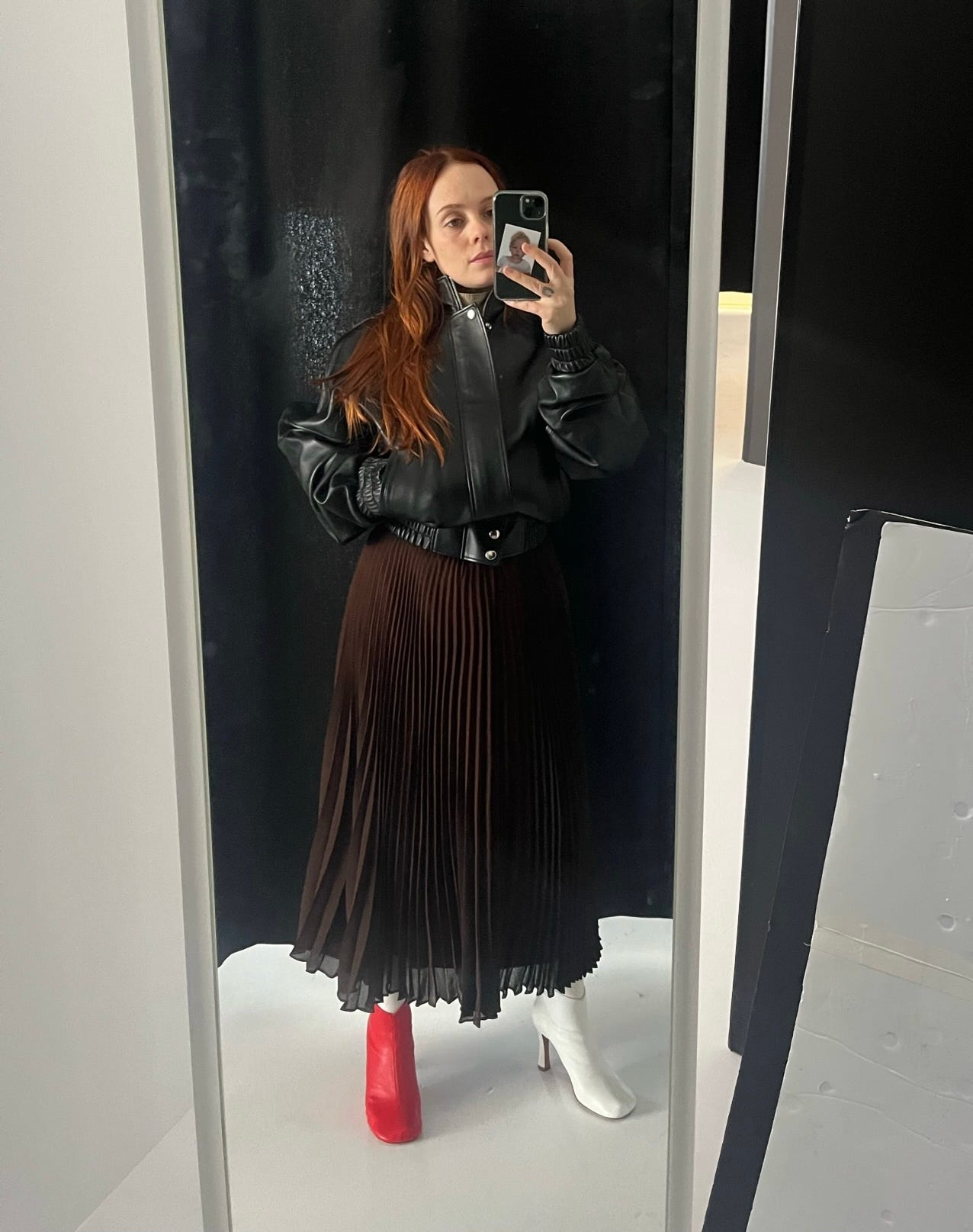Style Diaries: Kiara Lee Sayer is in transition
A conversation with SSENSE’s lead styling director on motherhood, fashion styling as a profession, and rebuilding her wardrobe
Housekeeping:
On April 30th, “Are you wearing that?” turns 3. To commemorate this milestone, I have an announcement on April 30th, so check your email! The letter will be in your inbox at 5 am PST/8 am EST.
My friend and writer, Adedoyin Adeniji spoke with me and other Nigerians for a BBC piece she wrote on the relationship Nigerians have with tailoring. It was a nostalgic read that conjured memories of my early teenage years in Lagos. You can read it here.
Substack says this post is too long for email. It is 9000 words long with lots of photos, so it might be best to read it on the app on the web.
Kiara Lee Sayer is the lead styling director at SSENSE. We have followed each other online for seven years which is the span of both of our careers as stylists. I asked her to chat about her work as a stylist and her renewed approach to dressing up after motherhood. What began as an interview turned into a revealing conversation spanning the differences in our works as e-commerce and personal stylists, motherhood, and our qualms with the current state of fashion.
This is the lengthiest conversation I have sent out and it was a challenge to reduce this rich 150-minute conversation to 38 minutes. I do not have much else to say in this introduction because the interview speaks for itself. I hope you stick this one out, it’s a worthy read.
I’ve divided the interview into three parts. Part 1 is free to read, and the rest are behind my paywall.
Part 1: Work, consumption, and the current state of fashion
SH
How did you end up in Canada?
KLS
I was working in visual merchandising. I used to work in Australia for American Apparel like everybody else did in the 2010s. And I moved to New York through that company. I was working there for a few years — three years actually — and met my partner, who lived in Montreal. We were doing long distance for a year and a half. And then I moved here to be with him.
SH
So how did you end up in styling direction?
KLS
I had never worked as a stylist before moving to Montreal, but I'd worked in fashion for a long time. I'd worked in a series of shitty fashion jobs, mainly retail and boutiques. I really disliked working in boutiques. It just wasn't for me. Sales is just not my thing. When I moved to Montreal, I didn't speak French, so I looked for work that wasn't customer-facing. I had a hard time finding work because I wasn't bilingual. And [Quebec] obviously has language laws, so it's basically illegal not to speak French if you're customer-facing.
I started doing some assistant work for stylists and interning for local e-commerce. I did some digital lifestyling, flat lay, that kind of stuff, PR shots. I did some editorial assisting work and then I started working at SSENSE. Back then, seven years ago when I started, it was quite small. There's a really special group of people that worked there then, and some still do. I was able to shadow a couple of people, and they're now my very close friends. And they taught me the ropes. I think I had a natural sensibility, and I think style, not necessarily luxury fashion.
SH
How did your background impact your styling sensibilities? I’ve written a lot about how I learned how to dress from my mom, which made dressing myself intuitive. I didn't realize how hard it would be to transcribe the things that I didn't even think about while dressing myself. It's been impactful for me, too, to analyze what I'm doing.
KLS
I grew up in a really small country town in Australia. Dressing up was a means of self-expression and trying to find myself and my way of rebelling.
I was very isolated and recreating things for myself helped. My parents were very encouraging. I think my mom is probably the most extra person in Australia.For as long as I can remember, she encouraged me to wear whatever I wanted. And she sewed a lot of my clothes. Thinking about what I wanted to look like so young made me fall in love with clothes. And it's just part of my personality. Right now, I’m learning that transcribing or defining it is so tricky. Now when I'm trying to teach other stylists how to do what I do, you're really trying to instill this kind of magic into components and teach it. It's making me think a lot more about why I dress the way I do and what is instinctual for me and why things make sense. I think about balance and tension a lot.
SH
So you're teaching younger stylists, up-and-coming ones at SSENSE?
KLS
Yes, I am. I recently became the lead styling director at SSENSE and we have a lot of stylists that work there but now I have my own team so we're really trying to distill what makes a really great styling recipe and try and scale that. It’s a very interesting and kind of scientific process.
SH
Yeah, I think I was really interested to talk to you because I'm intrigued by how very little expertise and training is involved in becoming a stylist, especially wardrobe styling. For a long time, I wouldn't even call myself a stylist because I was like, everyone's a stylist. So what does it even mean?
KLS
I 100% agree. I feel like I had imposter syndrome until recently. And I'm like — wow, I've been a stylist for seven years now. And I know what the fuck I'm talking about. You know?
SH
It took writing the newsletter to believe myself as a stylist. No matter how well-dressed you are, it doesn't mean that you can dress someone else. Whether you're dressing a model, dressing for the runway, dressing for a magazine, dressing people for their lives, bridal styling. There's all of these skill sets. But I couldn't do runway. I have no idea how to make those kinds of outfits. For a long time, I used to shit on SSENSE’s e-commerce styling, but I started to understand what you guys are doing there. The reason I didn’t understand it is because I view clothes from a wardrobe styling, which is very practical and individual. I don’t know how to make an outfit with an audience in mind. It’s hard for me to wrap my mind around that. And I started to respect it because I'm like, “oh, this is my lane.” I can't do magazines — the people who do editorial have a different skill and can't do what I'm doing. I really think dressing someone for their lives is not the same skill as e-commerce because your objectives differ.
KLS
Right, and I think that that's key. You have to think about what your goal is. The goal of e-commerce is that you're trying to evoke an emotional response in a really broad range of people.
I've recently been thinking about personal styling and how difficult it is. I'm styling my best friend for her wedding and it is so hard. The amount of work, the back and forths. I find myself talking to her about, “What's stopping you from making this decision?” It's so different from working with a model and you’re putting things on them and it’s not about them.
SH
Some of my recent clients have worked with other stylists. My conclusions are that they were personal shoppers and not stylists. I did this questionnaire in my stories, I asked, “What has stopped you from hiring a stylist?” And a fourth of the responses were, “I'm scared that someone's going to dress me like them.” I feel like that is 50% of the job, knowing that you have a signature. I have a signature of how I like to dress my clients and you could put all of them with their different tastes in a row and you will see the same note because that's my flair, you know? But I make sure that I get to know these women and they're just as engaged in what I'm doing for them. And I’m making sure what they've asked for and what I think is best. I can make suggestions, but I try to leave the ball in their court to choose. My practice is like: We need a sweater. Maybe a crew neck sweater. So I'll send you three different kinds and you pick one. So I'm selecting, you make the final choices, and then I want to know why you picked that one.
KLS
Yes, they choose you for your perspective.
SH
And it's been hard to see so many people undervalue having a trained perspective. Some people think, I should know how to do this. And it's like, no, I didn't know how to do this until I started practicing it. Recently, I thought about why I launched my shop. One of the main reasons was I wanted to practice styling because no one would give me an opportunity. I launched my shop to learn how to dress people. Most of the collections I was building were around the model. I considered what suits their body shape; when they came over for fittings I would let them go through the racks and note what they gravitated towards the most. I sourced collections around what they felt best in because I felt like they came alive, because they were wearing something that they enjoyed putting on.
I learned a lot with my shop and I wish more people were committed to learning.
KLS
I was talking to my boss, the director of the SSENSE studio, about this very same thing earlier today. And she's somebody whose opinion I really respect. And she was like, I really firmly believe in a hierarchy.
Most people talking about styling aren't really qualified to talk about it. And I really don't mean to sound arrogant or conceited in that way. You know, I have this foundation of knowledge and it's taken me 20 years. I bring a lot of experience and knowledge about fabric and construction and function, history and cultural references to the table. It's a practice and it's something that I work on every day.
SH
I like to work with multiple clients at the same time. And I choose people who want different things from me because I learn the most when I'm doing different things. Currently I have a returning client who is pregnant, another one who is a graphic designer and has bought all the right things, but doesn't know how to put them together. A third one is a software engineer who works from home, but she loves clothes and she loves classic things. And when I say classic things, she likes the classic Calvin Klein button down, but then she'll also buy Commes Des Garçons. She wanted help with making sense of these extremely different styles of clothing and silhouettes. She liked things that I wouldn't wear and many things I suggested via the newsletter or some she directly bought when I had my shop. And that was the most exciting and challenging wardrobe I have worked on.
Funny story about this third client: I was looking on SSENSE and I saw these Jil Sander over-the-knee boots, you know, the loafer boots. I was looking at them and thought, these are so ridiculous. And then I fly to Seattle to do her wardrobe and she has them. And I almost buckled when I saw them because I'm like, “You're going to make me style these?” She said she hadn’t worn them yet because she didn’t know what to do with them. My instinct was first: “Get rid of them!” Then I realized it’s because I didn’t know what to do with them; it wasn’t because they're bad shoes. I do love a challenge, so I started looking at photos of runway shows for designers that she loves that I wasn't super familiar with. And the next day I came back and I styled it 17 different ways. It's just been incredible to explore things that I'm not familiar with, that I don't know the language of, and to still find appreciation and interpret it for her in the way that makes sense to her and the way that makes sense for me. And that skill, it's not something that you learn from just consuming clothing. You learn it by studying, practicing, failing, and trying again. It’s frightening to observe a generation of people who refuse to study. I've been lucky because I haven't had clients who undervalue my work.
I'm finding that Substack, Instagram and TikTok, have created this overindulgence in thinking about ourselves. Like too much navel-gazing is happening around clothing. And for me, dressing up has always been about accidental discovery. I was not dogmatic in my approach. I was discovering things and I noticed some and ignored others for later. I'm saying: This is what I do for clients, and if you want to learn how to do it, this is how I do it — but I don't expect everyone to do that. I actually don't want you to do that because you're thinking about clothes too much and you need to go out and just have fun and wear your clothes however you want.
KLS
I think you're right. There's all of this thought or conversation floating around right now about defining your personal style. It was “capsule wardrobes,” and now it’s “defining your personal style.” And it literally gives me a headache. I mean, first of all, it's not my business how other people perceive me. I know what I like, but I think people are thinking too hard about it. And I think you should gravitate towards what makes your heart sing. After reading your newsletter and following you on Instagram for sometime, I’ve looked at my life and my wardrobe to try and figure out what actually works for me and what I need to let go of and what I need to maybe invest in. But I don't want to feel limited. I feel actually getting rid of things has helped me play and explore my things more.
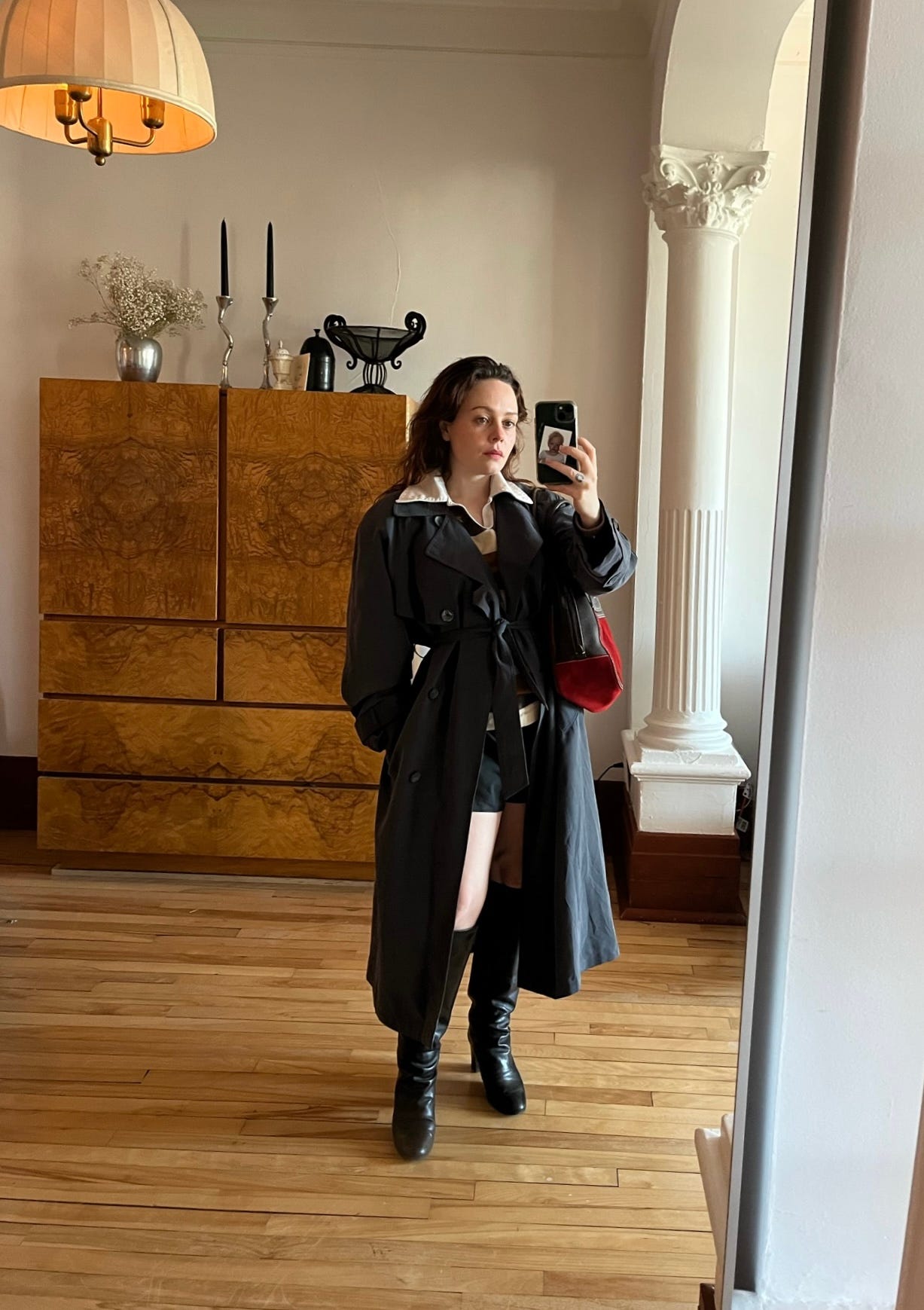
SH
How has working in retail commerce affected your wardrobe? You see everything before it goes online.
KLS
That's a really great question. When I first started working in luxury fashion, it immediately started me thinking about the things that I lusted over before. I stopped because you're seeing the scale of consumption, and it’s crazy. And the other thing is that I have the privilege of being able to see hundreds of items every single day and touch and feel them. And I've always prided myself on studying garments and studying construction and fabric, and knowing fabric by feel, and things like that. But it gave me an education on quality. I think I buy less than ever before. I've become immune to the marketing that's used in fashion. I see the trends come and go so quickly and it makes me think about what I actually really like and how a lot of stuff is just garbage.
SH
Last year, I interviewed a shoe designer who was entering the luxury space and she talked about how luxury is an “experience” and how you're buying into the experience. I remember saying, “I'm not a customer that needs the luxury experience when I'm shopping, because I know what I want.” So no matter how great the experience is, if I don't want something, you can't convince me to buy it. I went to buy lingerie when I was in New York recently and the customer service was incredible. The ladies were right there. So every time I needed a different size, they got it before I took off the one I was wearing. That's what I want. I don't need the fancy smells and a glass of wine. I feel like a lot of people get really caught up in that, the theatrics of purchasing. And some of us aren't even honest that we acquire things for class ascension.
KLS
I think it's hard for me to willingly spend my money on something like this kind of luxury experience when I see the behind the scenes of it. I'm very particular about what I like. I think finding clothes is my biggest passion and hobby. I have a million tabs open.
I'm always on every single shopping platform, different auction sites and things like that, finding stuff in Japan. I love a deal. And that's way more thrilling to me, finding something special that that feels… that appeals to me, you know?
SH
But then do you get lost in the thrill of it? Because when I was selling vintage, I had a few customers who I thought, you don't care about what you're buying because there is no consistency here. You're just excited that you're the one that got this thing. We’ve prioritized the thrill.
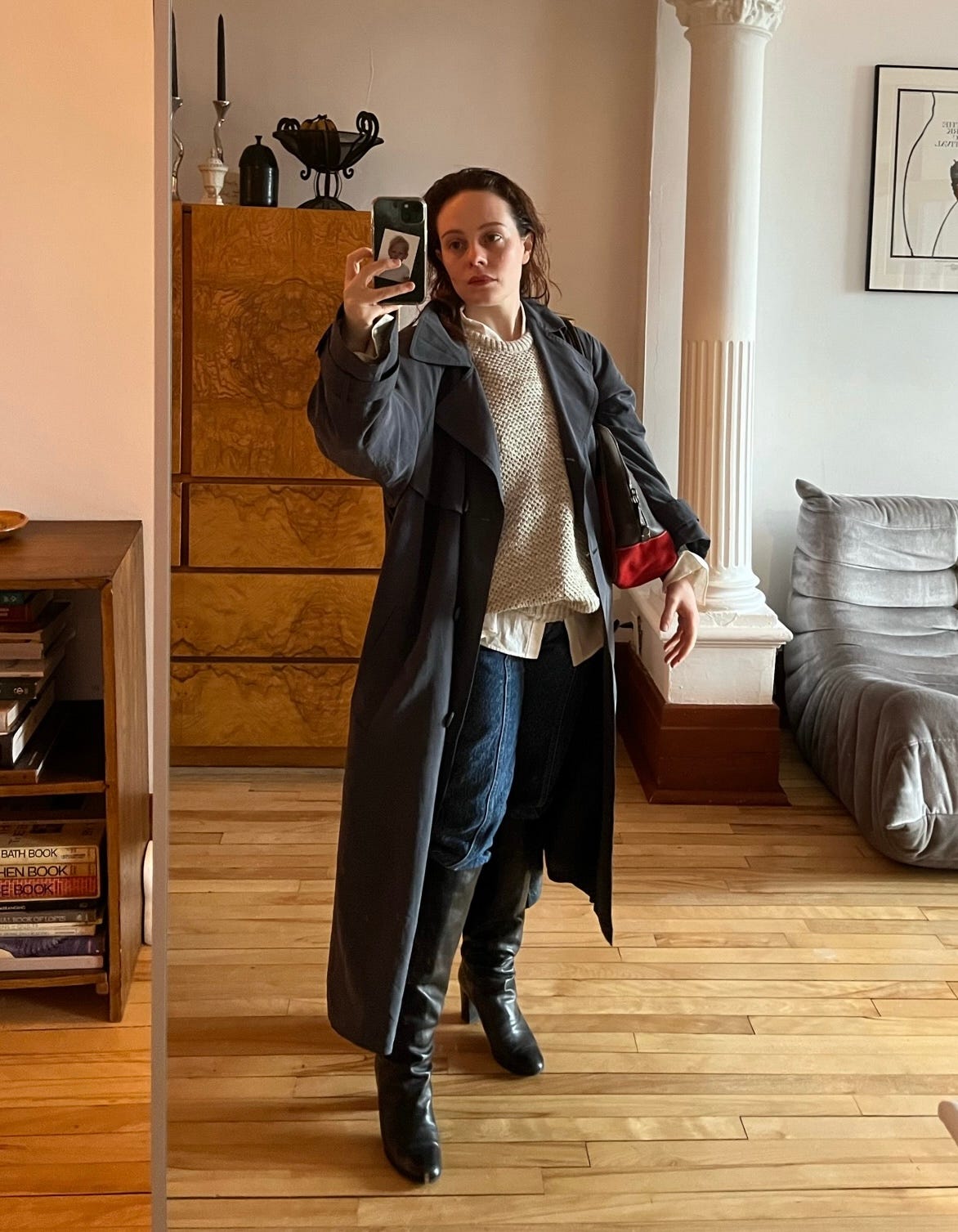
KLS
I definitely fall victim to that. I keep a list in my notes of things that I actually need in my wardrobe. And so when I am at a vintage store or shopping online or looking through eBay, I'm going to consult my list and be like, do I need this?
But my greatest pleasure is shoes. I collect Celine shoes. And I have millions of them. It’s just like an erotic object for me, and yes, that is… I am victim to the chase. I'll be like, “I'll never find this again”, or, “I'm basically making money at this price.”
SH
Thank you for your honesty. I see it all the time in how people dress and the things they buy. There's this air of like, “It's exclusive, so I want it.” That's the allure, the exclusivity — and not necessarily, “I want this, I like this.” And so you're constantly cycling through your wardrobe because you have not formed any attachment to the things that you buy. And again, it's about balance and tension, like you were saying at the beginning of this conversation — balance in not going overboard in assigning too much value to earthly objects, but also knowing that if you do not have an emotional attachment to some of these things, you're just going to keep buying and nothing will satisfy you. Maybe [an object] doesn't delight you, but you appreciate the craftsmanship and the amount of work that went into creating it.
KLS
Yeah, I totally do. I'm literally chuckling to myself because I have two pairs of sneakers. One of them is ten years old and they're ugly, but I literally cannot form an emotional attachment to any pair of sneakers that I've seen. And I really need new sneakers.
SH
I have one. I have one that I have an emotional attachment to.
KLS
There's not one pair that moves me, so I'm wearing these ugly Nikes that are ten years old because I would rather suffer in these, waiting for my soulmate in sneakers.
SH
And I think that's a good practice — sticking with one thing until you find “the thing.” I feel like a lot of people might just keep buying something until they find the thing. And that's what I'm saying about the balance and tension — you need to find the line and don't cross it. Create that line for yourself and stay on the other side of it. That's good. Don't find out what happens on the other side of overconsumption, because I think it's a lot of emptiness.
KLS
It is, and you ultimately feel unsatisfied. It’s fine to hold out and wait for things. People are so used to getting what they want so fast. Our lives are really built around convenience, and online shopping provides that. I was talking to someone I've been friends with for 20 years and we were talking about when we were teenagers, how we would save up for things and, and put something on layaway. Why not save up for the best you can possibly have?
SH
And if you can't, again, if you don't find a way to love and cherish your clothes, you should just know that this took a lot of work and you shouldn't be buying so much of it — because if you can afford that much of it, it means you're not paying the person whose time and labor went into this.
